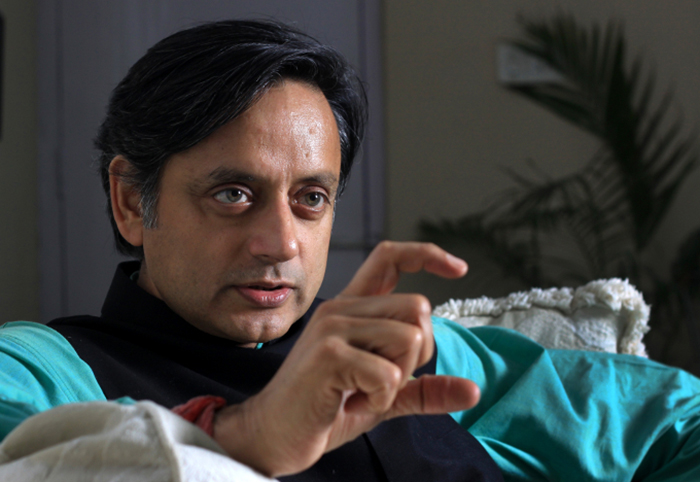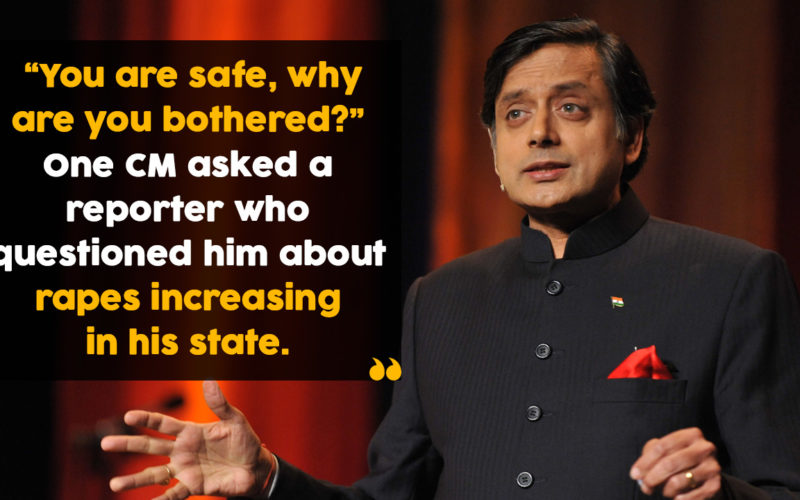- 1.6Kshares
- Share
- Tweet
- Facebook Messenger
It’s almost impossible to live in a society where the leaders of the country shy away from talking about rape. They not only un-support a woman who has been raped, but they end up blaming her jeans, skirt or character for what happened to her. They make the society believe that the girl deserved a ‘punishment’ for thinking she can be whatever she wants.
With Hindustan Times 8 letter series called Let’s talk about Rape, eminent politician Shashi Tharoor pens down his views and writes a letter to fellow politicians of the country and encourages them to openly talk about rape.

It is wrong to blame rape on the victims. Too many politicians point to the way women dress or behave for the violence inflicted upon them. Jeans and short skirts have each been blamed, as has “being out with a boy late at night”. Why do politicians place the onus on the girl to dress in a certain way rather than the boy to behave properly? It’s our job to work to create a safe society where a woman can go anywhere at any time without having to fear assault — not to excuse the criminals who prey on women who dress a certain way.
We politicians must also stop making excuses for rapists. It is wrong to suggest that “boys will be boys, they make mistakes” or that laws mandating the death penalty should be changed. The law should be supported — and “boys” should be responsible citizens of our society, not just “boys”.
Rape is not an acceptable response to changing social mores. Rapes have been blamed by a sitting CM on men and women interacting freely, and by a former CM on the absence of child marriage. One criticised girls carrying mobile phones, since his mother never needed one. Phones do not make women more vulnerable, of course. And turning back the clock on progress never actually changes the time.
But all these comments point to the real problem: politicians have not fully been able to come to terms with the growing emancipation of women in our society, their increasing freedoms, their autonomy from male control — on everything from how they dress to where they go, when, and with whom. When some men react to unfamiliar circumstances with violence and assaults, some politicians are reluctant to condemn and punish them, because at heart they share the same resentment the rapists feel.
At the same time, we politicians, even the women amongst us, express patriarchal attitudes. We see rape not just as physical assault but as respect-depriving tragedy; the trauma of rape is compounded by the level of social stigma attached to it. The victim is made to feel that she has been defiled, violated and shamed publicly, and is no longer fit to lead a normal life – even a woman minister lamented that a rape victim was a “zinda laash” (a living corpse). Politicians must not reinforce social control of female sexuality and male sexual entitlement, which we do, for instance, when we oppose criminalisation of marital rape. We have a duty to reiterate that rape is not about sex: it is about violence.
And though our job is to protect women, we sometimes act as if sexual violence is not a priority for us. “You are safe, why are you bothered?” one CM asked a reporter who questioned him about rapes increasing in his state. Our tendency is to dismiss rape as “a women’s issue”. It’s not. It’s an issue that affects all of us, male or female, because it affects all of society.
As political leaders, we should also speak out more against social attitudes that, by diminishing women’s value in our society, could one day prompt or justify violence against them. Preferential treatment given to boys over girls in our homes and workplaces. Abuse of women on social media. Attacks on women journalists and writers. Sexist portrayals of women in popular culture that legitimise male harassment, whether the songs of Honey Singh or movies that glamourise men stalking women.
We must stop confusing our idea of a family’s honour with confining women behind a lakshman rekha that they must not cross — and believing that if a woman transgresses it, she deserves what she gets. Such attitudes must be fiercely opposed, and as leaders, we are uniquely placed to challenge them.
We don’t need to write new laws. The 2013 rape law is strong, but its implementation still has a long way to go. Women are often reluctant to report rapes, and policemen to record them. Successful rape prosecutions are all too rare. Sexual violence is rife in rioting, but lost in the clamour around the riot itself. We politicians know that while we can pass laws that protect women, we have to ensure the authorities actually enforce them. Too many politicians seek to undermine law enforcement, rather than support it.
Dear netajis, what I am calling for in this letter is zero-tolerance for rape by politicians. If we set the example, the nation will follow. Let us honour Bharat Mata and truly ensure her “jai”.
Yours sincerely,
Shashi Tharoor
If the leaders are able to dismiss a rape case marking it ‘unimportant’, how are things going to change in the country? Shashi Tharoor’s letter will give all our politicians some food for thought if they are willing to see his point.
News Source: Hindustan Times
- 1.6Kshares
- Share
- Tweet
- Facebook Messenger




